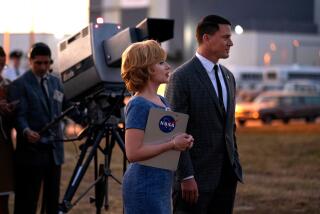Review: The kids aren’t all right in the allegorical space adventure ‘Voyagers’
The Times is committed to reviewing theatrical film releases during the COVID-19 pandemic. Because moviegoing carries risks during this time, we remind readers to follow health and safety guidelines as outlined by the Centers for Disease Control and Prevention and local health officials.
Neil Burger’s sci-fi flick “Voyagers” feels like the product of a brainstorming session that started with the concept “Nostromo for teens.” Indeed, the “Alien” DNA is obvious in “Voyagers,” but Ridley Scott’s 1979 masterpiece is inescapable in modern sci-fi. Burger has given the sturdy, familiar template a “Lord of the Flies” twist with motivation borrowed from Space X impresario and would-be Mars colonizer Elon Musk: Earth is too hot, so we must find another planet.
With that premise, writer-director Burger (“The Illusionist,” “Divergent”) takes the opportunity to pose the necessary questions inherent in intergalactic migration: How long will it take? Who will go? What do you pack? The answers provide the basic conceit of “Voyagers.” It’ll take too long — 86 years, in fact. So they have to plan for at least one generation to live their lives in space, reproducing future planetary pioneers. They should be old enough to drive but young enough to survive the trip. As for what to bring: more food, and less guns, would be prudent, though humans have never excelled at that. As the kiddie astronauts climb aboard their rocket ship, with Colin Farrell as the only adult supervision, one can’t help but think: We’re doomed.
All joking aside, the film is an interesting if blunt political allegory, using the spaceship and the young people aboard, who were conceived as test-tube babies and raised in isolation, as a way to examine social dynamics among human beings. In a crisis, they have to figure out how social order works without ever having experienced it for themselves. They’ve been genetically chosen for genius, and nurtured in an egalitarian pod, far away from socioeconomic inequalities, but Burger ultimately asserts that there’s no arguing with human nature and the forces of desire, lust, jealousy and rage.
In the wake of a power vacuum, the group consults “the program” and elects Christopher (Tye Sheridan) chief, which leads to Zac (Fionn Whitehead) plotting a coup, using the rumor that an alien has boarded the ship to manipulate their peers and stage a revolt. While it often has the feel of a lunchtime student council campaign, there are moments that resonate as we witness the effect that this toxic combination of fear and misinformation has among the crew and its contribution to the escalating violence and division aboard the ship.
The allegory drives the film, constantly burbling with questions about purpose, destiny and identity, as well as apt comparisons to modern political movements and authoritarianism. It’s just that the characters within this high-concept metaphor aren’t all that interesting beyond their symbolic function. Their isolated childhoods and scientifically calibrated brain chemistry have left them dulled and stilted. Despite having grown up together, these kids act like they’ve just met, as if they haven’t bonded with each other at all. Even when chaos erupts later, the chill permeates everything and never warms up.
Burger presupposes all the right questions (and anxieties) about the realities of climate change-induced space migration; it’s just that as a film, “Voyagers” feels like a role-playing game rather than a character-driven story. While there are fascinating ways to play out the different scenarios, as well as deep existential questions to ponder, the most important one isn’t answered by “Voyagers,” which is: Are we worth saving at all?
Katie Walsh is a Tribune News Service film critic.
‘Voyagers’
Rated: PG-13, for violence, some strong sexuality, bloody images, a sexual assault and brief strong language)
Running time: 1 hour, 48 minutes
Playing: Starts April 9, in general release where theaters are open
More to Read
Only good movies
Get the Indie Focus newsletter, Mark Olsen's weekly guide to the world of cinema.
You may occasionally receive promotional content from the Los Angeles Times.










